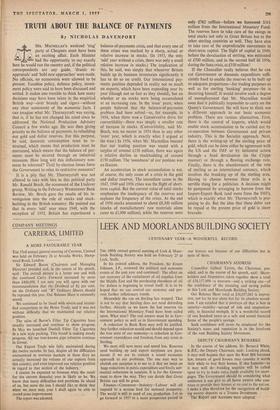TRUTH ABOUT. THE BALANCE OF PAYMENTS
By NICHOLAS DAVENPORT
MR. MACMILLAN'S weekend 'stag'
party at Chequers must have been \ an exciting affair. Each Minister had the opportunity to say exactly how he would run the country and, if the political correspondents are any guide, 'drastic re- appraisals' and 'bold new approaches' were made. No officials, no economists were allowed to be present. Taxation policy, defence policy, invest- ment policy were said to have been discussed and settled. It makes one tremble to think how many decisions may have been taken in the empirical British way—over brandy and cigars—without any clear assessment of the economic facts. I can imagine what Mr. Thorneycroft was saying, that is, if he has not changed his mind since he addressed the National Production Advisory Council a few weeks ago. He was then giving priority to the balance of payments, to rebuilding our gold and dollar reserves. For this purpose, he said, domestic consumption must be re- strained, which means that production must be restrained, which means that the balance of pay- ments must be secured through an industrial recession. How long_ will this deflationary non- sense be tolerated? Until by-election losses force the Government to relax its restrictive measures?
It is a pity that Mr. Thorneycroft was not allowed to take with him to this political party Mr. Ronald Brech, the economist of the Unilever group. Writing in the February Westminster Bank Review, Mr. Brech gave the results of his in- vestigation into the role of stocks and stock- building in the British economy. He pointed out that in every 'odd' year since 1948, with the exception of 1953, Britain has experienced a balance-of-payments crisis, and that every one of these crises was marked by a sharp, actual or relative increase in stocks. (In 1953, the only `odd' year without a crisis, there was only a small relative increase in stocks.) The implication of this, he said, was simply that whenever Britain builds up its business inventories significantly it has to do so on credit. Our international pay- ments position depended in reality not so much on exports, which have been expanding year by year (though not so fast as they should), but on whether or no stocks were being accumulated at an increasing rate. In the 'even' years, when people believed that the balance-of-payments problem had been solved—as, for example, in 1954, when there was a Conservative drive for convertibility—there was simply a smaller rate of increase in stocks. (Convertibility, said Mr. Brech, was no nearer in 1954 than in any other 'even' year, which is exactly what I argued at the time.) In 1956, when Mr. Macmillan boasted that our trading position was sound with a surplus of around £150 million, there was again a relative decline in stockbuilding of around £150 million. The 'soundness' of our position was an illusion.
An acceleration in stock accumulation is not, of course, the only cause of a crisis in the gold and dollar reserves. The immediate cause in the 1947, 1949 and 1956 crises was the flight of short- term capital. But the current value of total stocks emphasises the inadequacy of the reserves and explains the frequency of the crises. At the end of 1956 stocks amounted to about £8,300 million (stocks of manufacturers' raw materials alone came to £1,900 million), while the reserves were
only £762 million—before we borrowed $561 million from the International Monetary Fund. The reserves have to take care of the swings in total stocks not only in Great Britain but in the other sterling countries as well. They have also to take care of the unpredictable movements in short-term capital. The flight of capital in 1949, before the devaluation of sterling, was estimated at £700 million, and in the second half of 1956, during the Suez crisis, at £350 million !
If the Chancellor really believes that he can cut Government or domestic expenditure suffi- ciently hard to enable the reserves to be built up to adequate proportions—for trading purposes as well as for sterling 'banking' purposes—he is deceiving himself. It would involve such a degree of unemployment that Mr. Macmillan would soon find it politically impossible to carry on the. Queen's Government. He will have to think out a daerent approach to our basic economic problem. There are various alternatives. First, there is the control of imports, which would . enable stock accumulation to be carried out by co-operation between Government and private industry. This is • the Socialist approach. Next, there is the writing-up of the sterling price of gold, which can be done either by agreement with the US and the IMF or by unilateral action through a fixed devaluation (in the Cripps manner) or through a floating exchange rate. Finally, there is the abandonment of the role of sterling as an international currency, which involves the breaking up of the sterling area. Having to choose between these evils is a terrible thing for a politician. A decision might be postponed by arranging to borrow from the Import-Export Bank (and more from the IMF), which is exactly what Mr. Thorneycroft is pro- posing to do. But the idea that these debts can be repaid at the present price of gold *is sheer bravado.


































 Previous page
Previous page